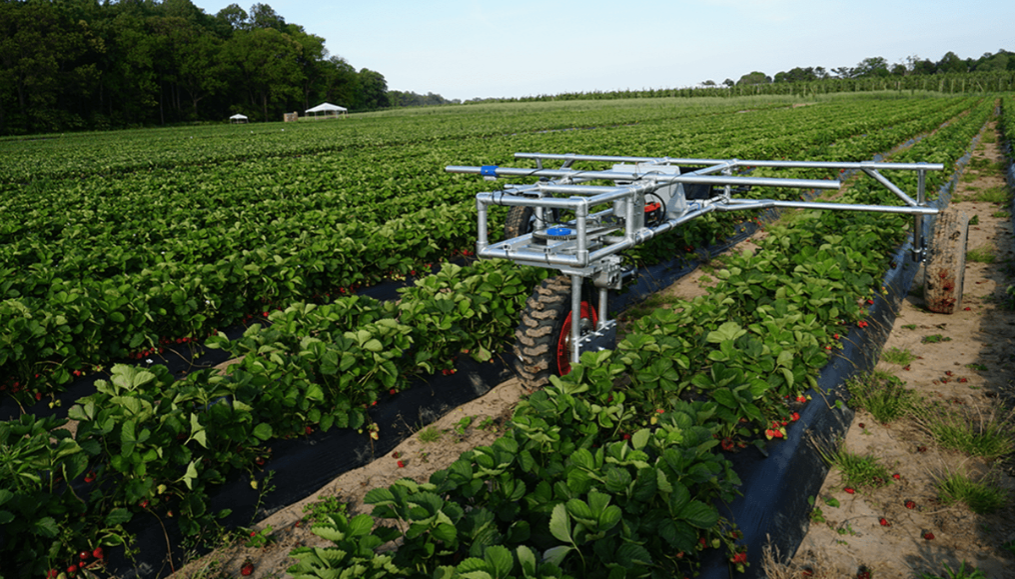The agricultural industry can’t shut down for a pandemic, and so far, neither has agtech research.
TRIC Robotics, a Newark startup — and 20120 RealLIST Startups honoree — that has designed a robot to autonomously treat strawberry crops with UVC light instead of pesticides, spent the week working in the field at Fifer Orchards in Kent County. (And yes, Fifer Orchards the farm is up and running; Fifer Orchards’ country store and the Farm Market Cafe in Dewey Beach are closed until at least April.)
“The goal is to replace pesticides on strawberry farms,” said Adam Stager, founder of TRIC Robotics. “We’ve got a robot that acts just like a Roomba — it sits on the side of the field and deploys itself automatically. The UVC lights have been shown by 10 years of USDA agricultural research to work as effectively as pesticide.”
Eliminating pesticides in agricultural crops would be a big thing, and TRIC Robotics, which was founded in connection to University of Delaware, has been receiving most of its funding through grants, most recently a nearly $50,000 grant from the Delaware Bioscience Center for Advanced Technology and a VentureWell E-Team Grant for $25,000.
This month, the team was supposed to go to Salt Lake City to compete in VentureWell’s Open Minds Competition. Instead, they competed in — and won — the competition virtually, with a component that allowed people from all over to vote.
“It was actually much less stressful [than other pitch competitions] because they had us just record 90-second videos,” said Stager. “My experience with Kickstarter taught me how to market a levitating top in 2017. We wound up getting twice as much virtual funding, double the second-place team.”
It remains to be seen exactly how Hen Hatch, in which the startup has reached the semi-final level on the alumni/faculty/staff track, will play out, but the annual UD pitch competition will continue this year in alternative ways since its final round at neoFest was canceled.
At the moment, TRIC is using three farms for testing, with each having its own robot: UD’s Carvel Research Center in Georgetown, which is a full acre; a third of an acre at USDA Agricultural Research Center in Kearneysville, Virginia with the inventors of the UVC treatment method; and a quarter of an acre at Fifer Orchards.
With only the family-run farm Fifer open this week, the TRIC team was able to focus on a single location and a single robot.
“Since it’s so close, Fifer has kind of been our go-to-field for field testing,” said TRIC’s Vishnu Somasundaram, who manages UD students who work on the team. “We run into new issues and challenges that we eventually overcome, so we’ve been there a lot.”
Getting access to to the farm meant convincing owner Bobby Fifer that it wasn’t too soon to put the robot into a working farm.
“The farmers at first were like, ‘Well why don’t you do this at a UD or something?'” said Stager. “I told them it’s not something we know works yet, we need to see if it works. If we showed it works at UD and then came to your farm next year with this technology that quote-unquote works, would you believe us? Or would it be better if we worked with the largest strawberry farm in Delaware and then came over to you and said it works?” With that Fifer, agreed to set someone thing up.
In January, TRIC Robotics gave a presentation at the North American Strawberry Growers Association Annual Meeting and Conference, where they connected with over 150 strawberry growers across the country, many of them interested in securing robots. If testing goes well, the team may start making deals at the end of the year — but they’re not looking to rush it out nationally.
“We have a nice home base in Delaware,” Stager said. “We’re working out of the house, we’ve got three farms where we can go test the technology. We we don’t want to put 20 robots on a field and be scrambling [if something goes wrong].”
Before you go...
Please consider supporting Technical.ly to keep our independent journalism strong. Unlike most business-focused media outlets, we don’t have a paywall. Instead, we count on your personal and organizational support.
Join our growing Slack community
Join 5,000 tech professionals and entrepreneurs in our community Slack today!





